
Do you wake up with stiff joints or tight muscles? Do you wake up tired after a night of sleep? Do you drink coffee or tea in the morning to get going? If you said yes, then know it is not part of your biology or destiny to wake up stiff, tired and unhappy. By making a few simple changes to your habits of breathing, moving, and even thinking, you can energize your every morning.
Thinking is Your Starting Point
Experiment with waking up without an alarm by creating a strong mental focus for yourself known as a sankalpah, or intention. Here’s how it works: before going to sleep at night, visualize how you are going to begin the next morning. Imagine yourself waking up feeling ready and alert. More often than not, a few minutes of pre-sleep concentration does the trick and you will find yourself waking up either before or right with your alarm.
Creating this sankalpah is a powerful and effective way of practicing with purpose. Often a sankalpah addresses an area of your life you want to deepen in order to transform unconscious habits into conscious and beneficial actions. In order to wake up ready to go, you may choose a sankalpah that puts you right where you want to be each morning. For example:
I launch into my day.
I wake up feeling supple and energized.
I create a great day with my first conscious breath.
Plant this sankalpah like a seed in your mind before going to sleep, upon waking up, and during your breath and movement sequences.
With a resolved mindset, we turn to the art of breathing.
Breathing Gets You Going
How you breathe makes a profound difference in how you feel. Changes in how you hold your breath, lengthen an inhale, shorten an exhale, burp or even hiccup will result in changes to your mood, energy, attitude and physical tension.
Breath can equalize, calm, or stimulate the body depending on how it is used. When inhalations and exhalations are the same length and effort, the body’s systems and emotions are equalized. Making your exhales longer than your inhales calms the body and reduces tension. And making your inhales more active stimulates the body and mind.
Now that we know this, we can use this last kind of breathing to get us up and going in the morning. Experiment with longer, bigger, fuller inhalations. Do three rounds right now and see what happens.
Do you feel more awake? Now imagine how those same breaths would set you up for success in the morning when you most need it. Breathing also has less calories than coffee, is free, and non-addictive!
Now that you are more awake and alert, let’s move on to moving.
Movement Prepares You for the Day
Moving immediately requires your brain and muscle tissue to synchronize, your blood circulation to increase to provide energy, and electricity to be produced by active neurons as your nervous system communicates messages from your brain to your muscles. Movement, then, literally and figuratively picks you up.
Yoga Tune Up® is designed to explore every conceivable movement for each joint in minimum amounts of time. Each movement is typically performed for therapeutic or performance enhancement reasons and leaves no tissue un-wakened. Since this article takes a different goal – to prepare and wake body and mind for a full and awesome day – I suggest you focus on the three biggest-bang-for-the-buck micro regions Yoga Tune Up® specifically addresses: shoulders, hips and feet. Why these three regions?
Feet: 25% of your body’s bones are located in the feet and ankles, the home of all our balance and connection to the earth. What we do with our feet makes a difference in our day through each and every step.
Hips & Shoulders: Major nerves and circulation pathways run through from your head and torso through your shoulders and hips to your hands and feet. Opening the physical pathways and literally circulating the tissue and bones brings in more nourishment and wakes up your nervous system.
Next week, we’ll outline specific routines to wake you up each morning.
Learn about our stress relief products.
Read how to breath away stress.
Read more about your diaphragm.


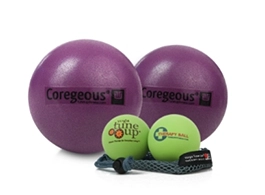
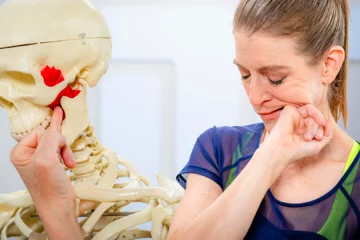
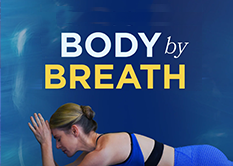



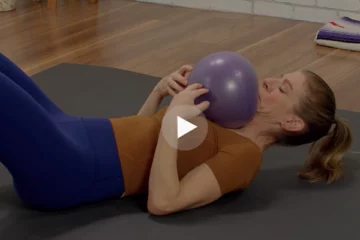

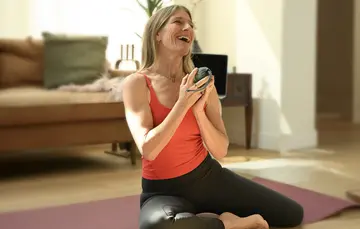

I like the idea of using Sankalpa’s or intention for the day. I will try this tip. Thank you!
Great idea wake up Sankalpa (you mean, not instagram first thing??). My left brain also loves “25 percent of bones in your feet!”. We got to flip the script and work on them feet!.
I love the breathing ideas here about waking up with longer inhalations. I am so accustomed from my other practices to extending my exhalations and this totally puts me back to sleep and encourages me to hit snooze! I never thought about taking more active deep inhalations and perhaps short exhalations just to get me going in the morning. Once I’m out of bed I for sure use Yoga Tune Up therapy balls and movements to get myself going quickly. Thanks for the breathing idea!
Mornings are the worst for me. I am going to give this a try!
I totally agree. When we’re sleeping, the muscles are relaxing for hours and they will need oxygen to wake them up. Also with a little of stretching and moving, that’s going to help spread out the oxygen throughout bodies and you’ll be awake with fresh energy.
This is great! I often wake up groggy. I’ve experimented with waking myself up at a specific time but never with the intention of being in a certain mood or state of alertness! I’m definitely going to incorporate this!!
I found this post at the right time, since I woke up this morning feeling tired, unenthusiastic and stiff. I’ve already incorporated Yoga Tune Up® into my morning ritual. However, a sankalpa and a few conscious breaths may be the missing piece to waking up more energized. Thank you for sharing this post, Alex!
Bonnes idées pour bien démarrer sa journée !
This is a great read and was easy to follow. I particularly enjoyed how you began with sankalpa work. I cannot count how many times I have woken in a panic, a head of my alarm, for fear of over sleeping. Every time this has happened, you can bet that I was worried about oversleeping as I was falling asleep.
I also love how you enumerated important regions to roll out in the morning and why. The feet is an important location that is often overlooked.
Thank you!
Hi Alex great article .I tried to change my mindset today and get myself out of bed without to much dread layed there eyes closed and thought about my sankalpa,then began taking conscience breaths it worked !!!I got out of bed feeling ok, ya who thanks alex feeling good
Thanks for sharing! Sleep has always been an issue for me. I am not a morning person and find it hard to wake up my body/mind without feeling groggy. I’m always looking for new ideas so going to experiment with some of the things you mentioned here.
Alex as someone who has trouble getting up and is always groggy in the morning I’m going to experiment with some of the things you mentioned in this article and see if practicing this mindset and breath control will change my morning feelings. I do always feel better having a big stretch after waking but the only thing my mind can think of is how warm and comfortable it would be to stay in bed. This will be a big challenge for me haha
Wow, what a richly informative blog, Alex. Thank you for all the ideas. When I have to get up especially early for a flight or a special event, I notice my system often wakes me up even earlier. I love the idea of harnessing this consciously and positively for daily calm and energized wake-up. I will definitely try this and pass it on to some of my senior students who dread the fatigue they often feel in the AM. Go sankalpa!
This is a very nice reminder of how conscious life decisions can change the outcome of our days. I have read something very similar some time ago but incorporated it in my life only momentarily. Now I want to come back to it, and I will try the breathing technique as well. Thanks!
I’ve always used the breath to calm. Definitely going to energize my breathing when I awake and see if I eliminate snoozing my alarm.
Then maybe I can play with eliminating the alarm.
Great advice for myself and for my students! I love the idea to give them tips for their lives besides the mat/class. Thanks for sharing this!
My job requires me to be up very early and I have struggled with getting comfortable with my wake up time. Even if I go to sleep early the night before, for some reason I am always tired in the morning. Pressing snooze often is my go to. I’m excited to try your suggestion of focusing on my Sankalpah the night before. Breathing and moving before I get my day started will be something I will make a point to do every morning! Thank You!
Post your most recent Sankalpah. What’s alive for you these days?
My Sankalpah is still to hand over my anatomy homework to you. But for now it is to fully absorb all of Jill’s knowledge and survive YTU. Thank you for the awesome presentation of the Anatomy. It was a great preparation to meet Jill! I incorporate the tune up balls with my morning routine along the pranic breath; however still coupled with a strong cup of coffee. It’s an addiction…
Awesome post Alex! One of my favorite things to do in the morning is get my Yoga Tune Up therapy balls under my feet. Rather than waiting till they start feeling stiff later in the day, taking the time to treat them in the morning helps me remain supple and feeling awesome! Being well hydrated and drinking water first thing in the morning also does wonders for shaking off sleep and getting going! Thanks!
i really love the idea of focusing on a sankalpah to begin the day. its one of those very simple but not so easy to take time to do mental exercises that can mean the difference between a really clumsy off day, and an inspired, focused, aware one. and breath! its the same thing: simple, simple, simple, transformative and the cure for pretty much ANYTHING. but yet its not that easy to remember to do in this modern world. we are alive, and that is one of the only things of which we can be certain! so how about we BREATHE?
thank you for sharing. i have been practicing and teaching yoga for several years and to this day my favorite experience during practice is breathing. perhaps on your next blog you can add, “got breath?”
Thanks for this article — I’m going to try the practice of setting an intention for the next day prior to going to sleep. I kind of feel like going to sleep with an intention of what time to wake up (without the help of an alarm) would make me avoid going into a deep sleep, but perhaps i need to trust myself more…
Hello Alex,
I have started to put your recommendations to practice and found that just the morning intention alone had allowed for a good night sleep. It is a very ayurvedic approach and it helps to bring flow and balance to the doshas during the day from the dominant kapha morning, to pitta time, then to vata time. Thanks for caring and sharing.
Hi Alex! I stopped drinking coffee in January and adopted an early morning practice as my natural caffeine. I can’t wait to try your breathing exercises as well. Since I stopped drinking caffeinated beverages I have found that I don’t crash midafternoon, nor do I have problems going to bed. Additionally, I have felt more balanced and have had fewer head and stomachaches.
Great information! We can only live without our breath for minutes. Very fitting that we’d focus and fulfill that need first when starting a new day.
Thank you for this, very informative. I usually tend to feel really sluggish midday. I’ll try these breathing techniques, the only thing I’m worried about is how quiet I can be in a room full of people!
Great article and I’m anxious to try this soon. I wake up with 3 alarm clocks set to different times and I definitely want my cup of coffee before turning on my computer at work! I like your breathing suggestions particularly as I don’t really focus on my breath at all when I wake up.
Thank you for this great article! As much as possible, I try to wake up without an alarm clock, tho I occasionally set one for *back up*. I notice that I feel much better when I allow my body to coordinate its sleep cycle in correspondence with my waking sankalpa.
As for moving right away, I confess I have a predilection for starting work on my computer before getting out of bed. Too often my morning will slip away completely. Now that I have shifted from a structured work schedule to self-employment, this has become all too easy. Your article inspires me to challenge this insidious habit.
I’m going to try this, but I’m also unsure whether I’d ever be confident enough to actually not set an alarm. Do you find that it’s a lot less reliable if you haven’t gotten enough sleep for a few days in a row?
Waking up with Coffee is like a ritual to me. I really appreciated your advice about taking a few deep breaths and you can feel right away the impact of effective breathing.
Visualization is such a strong tool, I guess i have been limiting myself to its benefits. I am going to try your advice before I rest tonight.
I used to drink coffee every morning when I woke up, but it was not working for me anymore. I started reading articles from Kimberly Snyder (nutritionist) and she suggested to drink water (hot or cold) with half of a squeezed lemon. I started drinking hot water with lemon in the morning instead of coffee. The first couple of days were rough because I had a headache that would not go away, but once the caffeine was out of my system I started feeling the effects of the lemon water. It gives me so much energy that lasts throughout the day and I do not feel as groggy anymore. I still drink coffee sometimes when I am really in the mood for it, but its usually in the afternoon now. I definitely recommend trying this. It really made a difference for me! I also do sun salutations as soon as I wake up to get the “fuzz” out of my muscles and awaken them.
I like the relationship between a sankalpah, the breath and asana practice as an integrated approach. The idea of setting an intention before going to bed is a particularly interesting way of starting the day before it’s here. This ‘pre-meditation’ is a great way to set the mind in motion before the body wakes to join in. Whether conscious or not, the following morning’s practice is likely to be influenced by this.
Not sure if I’m ready to give up my alarm yet but the good news is I wake to very relaxing meditation music. I agree with starting your day with a bout of prananyama. I tried to start every morning with a combination of chanting, light yoga and breath work. Particularly breath of fire in dealing with a long bout of chronic fatigue I found just 4 minutes a day help to balance my central nervous system. Another morning tip I recommend is finishing your warm shower with a COLD shower. I know brrrrr but first lather up with oil and for a few minutes actively rub the oil in all over your body under the cold water. Talk about stimulation and also a great way to get the blood flowing and not to mention the benefits of cold water on your hair and skin:)
Sankalpah has always seemed to work for me. I am definitely not a morning person but if I visualize myself sleeping for a length of time and waking up with energy to do what I need to do it seems to help have more energy. Breathing and stretching are obviously things that we seem to overlook and need to pay more attention.
These breathing concepts make me think that the yogis who came up with Kapalabhati (fast, forceful exhale, involuntary inhale) might not have known they were working with a breathing technique that should actually calm the nervous system, but I suppose the tempo of the exercises is what makes it more energizing and heat-building. I like the YTU version that’s done more slowly, too.
“I’m simply not a morning person” is my typical response although after reading this blog I’ve realized that I’ve never allowed myself the opportunity to be a ‘morning person.’ I visualize my goals in life so visualizing how I wake up is such a natural step for me that I will definitely try. I also learned tonight that before bed, while visualizing how I wake up, I will breathe using my abdominal muscles so I am more relaxed. As I wake up, before getting out of bed, I will use my thoracic breathing to energize myself to help eliminate a typical caffeine run. Thank you for sharing!
Great recommendations. I’ve had to switch to the most annoying and loud alarm sound I could possibly find because I easily sleep through my alarm in the morning without even feeling it. It’s worked wonders but I’d rather wake up peacefully than to the sound of blaring horns, so I’ll try using sankalpa this whole week to see how it affects my waking routine. I’m usually so spent at night that I roll into bed and fall asleep without any pre-planning for the day ahead, so hopefully infusing a little intention into my consciousness will make a difference!
During YTU training Level 1 – is my first time creating a Sankalpa, in fact my first time knowing about the term. I am in complete control of it – here we are 4 days into training, and I find my Sankalpa coming to the forefront of my thinking at various times of the day. This may evolve into a power thing! I’m definetly going to try one before bed – but keep the alarm for the time being.
I think repeating your sangkalpha before you go to bed is a great idea. It’s so simple that you may underestimate how powerful it can be. Sangkalpha’s work on the basic law of the universe which is that what you focus on is what you create ,
thanks for your post!
“I regard myself as great”.
There are so many to choose from, and the best is the one that is serving you today.
Irene – I hope your sleep is improving!
Marina – there is so much with YTU that can help people with asthma, in general. Of course, specific context always matters. But generally, releasing respiratory tissues and down-regulating your nervous system should make a difference.
I believe that practicing with the Yoga Tune Up ball can help people with asthma to breathe more easily during the night. My husband has been practicing it for a while and I can see the progress – he has less and less breathing problems throughout the night.
Great article. Sleep has been a constant issue for me (more related to falling asleep and staying asleep). I have found that waking up without an alarm clock, even if it’s at an earlier time than when I might have set my alarm clock, leaves me feeling better rested because I’ve completed a natural sleep cycle. I look forward to trying these breathing exercises in the morning; I am sure they will help me recharge after a night of insomnia.
Thank you for the reminder to create intent for the sleeping cycle. It brings awareness to two things we often take for granted. Creating intent changes the quality of the acts of sleeping and waking. Will do tonight…now I just need to score a foot massage.
Its true! even without setting a conscious/verbal intention I have sometimes had (one of those may) conversations with myself about how I envisage my morning and day looking like tomorrow, coz I am usually one of those ones who hit the snooze 4-5 times and then I wake up exhausted and conjested and still want to go back to sleep some more. But If I have made a plan or a pact with myself the night before that delights me – like promising to get up and do my 10 rounds of Surya Bhedana,my 10 of Ujjahi and a few simple sun salutations, (and bargaining with myself that it really will only take 20mins of my morning, thats nothing!) I find my eyes glide open and stay open and a feeling of achievement has already began the day!! Its very healthy positive feeling. Im grateful to have found it, something to hang my morning smile on, finally
I am gonna try your intention advice and see if I can start my day that way. Thanks!
I’ve also been waking up before my alarm clock the past few weeks. It’s a great feeling to wake up naturally, rather than be shocked into being awake through the buzz of the alarm clock. The alarm clock is now more of a backup (except for those early morning flights, which are still a challenge). With waking up naturally and then going to a morning yoga class, I feel a lot more energy throughout the day as well.
This article is so true!!! I think right before the alarm goes off, what am I doing today? what am I wearing? After I do that I feel an ease with getting up to conquer the world, whatever it is!!!!
Love this Article. Since I have been training to be a yoga teacher, I am always waking up before the alarm as I am excited to start the day. Not sure if it is my breath being better or just enjoying what I am doing. I still set the alarm but not sure I need it!
Great article, Alex. Most mornings, I wake up minutes before my alarm is set to go off. I love it that my body is telling me that it is ready to get up, when it is time to get up! I haven’t put enough trust in it yet, though, to not set the alarm ! 🙂
I definitely have difficulty feeling alert in the morning and am looking forward to trying Alex’s breathing and sankalpah suggestions.
I would never have thought to use my sankulpa as an alarm clock! I have experiemented in the past telling myself I would wake up a certain time before going to sleep – and it worked. I can’t wait to try the same technique with my sankulpa. It’s amazing to me that simple words can have such a powerful meaning and benefit to my psyche and body. It’s a better feeling to know I am driving through life with a map – looking forward to tomorrow morning 🙂
I find it so amazing that while breathing is an autonomic function, we have the power to shape it to what we need on a given day. The ability to energize or sooth ourselves is available on any given day. One of my biggest break throughs occurred not long ago when I woke up at 4am, agitated and preoccupied. Rather than lay in bed and chomp on a myriad of disturbing thoughts, I got up and went into my meditation room and set myself up for savasana and just began breathing with the mantra, “I have the ability to sooth myself.” Within 20 minutes I felt only the rhythm of my own breath and them fell asleep for another hour. When I awoke I was refreshed and in a different mindset. I guess I used a Sankalpah without realizing it. Will definitely try implemently this technique before falling asleep.
Creating Sankolpa and reaffirming it everyday is a great practice. I haven’t used an alarm clock in ages. Addressing stiff joints or tight muscles I am always remind myself to sweep away the cobwebs built up from the previous nites deposit of collagen in between the muscle fascia. I just learned how to use the yoga balls to aid in loosening up the muscles to make sure they will be hydrated and oxigenated by stimulating blood flow in the area worked upon. Conscious breathing is wonderful. The ability to over ride a normally autonomic function is awesome! Breathing in itself is such a wonderful function of the body. The diaphragm literally bisects the body in half creating two cavities. The thoracic cavity contains the lungs and the heart while the abdominal cavity contains the stomach, liver, kidneys, intestines, pancreas and other organs. Although the abdominal cavity is like a closed balloon the thoracic cavity is like a balloon with the neck open (lungs, esophagus to the mouth). This arrangement allows the abdominal cavity to change its shape by the compression of the muscles surrounding the abdominal region, such as the rectus abdominis, internal/external obliques and transverse abdominus, which attach to the abdominal aponeurosis anteriorly and thoracolaumbar fascia posteriorly. Compression of the abdominal cavity, since it’s filled with organs which for all intent and purposes is made of mostly water, is like squeezing a water balloon causing it to bulge. This bulging causes increased pressure onto the thoracic cavity, acting like a pair of bellows, and creates the exhale. The diaphram can also be engaged to either compress the abdominal cavity and decrease pressure in the thoracic cavity by increasing its volume.
I like your idea to start the day with conscious breath. Get this diaphragm going 🙂
love this article…I always try to wake up without an alarm. Because I’ve found when I do, I have alot of tension in my upper back (around my trapezius)- break yourself from the alarm!
That’s awesome Chris. Keep it up! Regular practice to the point of conscious routine/ritual can make a tremendous difference.
I’ve been trying the breathing technique of the long full inhalation and the short quick exhale. It seems to actually work. I was doing it in the car last week on my way to a meeting and sure enough, I began to feel much more alert.